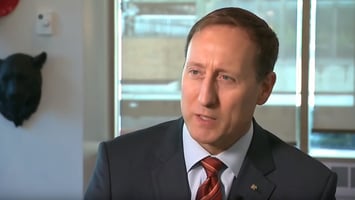The dust has started to settle on this year’s general election. Labour has gained a historic win,...
Imagine a journalist describes your spokesperson’s interview as “ridiculous”.
Then consider an adviser intervenes and brings the questioning to a halt.
You don’t need us to tell you the outcome is not a good look.
Yet, it just happened.
Not got time to keep reading? Listen to the blog instead
We’ve tried to avoid commenting on interviews carried out on the General Election campaign.
But Richard Holden’s was so comically bad – and has received so much attention - we could not ignore it.
The Conservative Party chairman was until recently the MP for North West Durham.
But he’s now been parachuted into a safer seat with a 20,000 majority, 300 miles away in Essex.
And it would seem he is not happy to answer questions about the controversial move.
In fact, during a pool interview for broadcasters, he ignored them altogether.
"I'm going to stop you now… this is ridiculous" - @joncraig
— Sophy Ridge (@SophyRidgeSky) June 9, 2024
pic.twitter.com/8DxtJKNbKV
Asked by Jon Craig how he justified being parachuted into a safe seat, he replied: “This interview is about Emily Thornberry’s comments today where she admitted… “
That answer refers to comments made by the shadow minister about Labour’s plans to tax private school fees.
When the journalists said he and other broadcasters wanted to ask about Mr Holden’s selection and suggested it “looked like a stitch-up”, the politician replied: “Emily Thornberry today has completely admitted Labour’s approach…” and continued with the same answer.
A third attempt asked whether he was “not denying it was anti-democratic and a stitch up.” There are no prizes for guessing how that answer began.
Yes, “Emily Thornberry has today admitted,” he said.
At this point, the journalist had heard enough and intervened, saying, “This is ridiculous” (twice), while Mr Holden claimed to have answered the questions about his seat move in an interview with Channel 4 “last week”.
And an adviser could be heard off-screen saying: “If that's the way this is going to go, then we'll just leave.'
The same adviser also said questions about Mr Holden's seat selection row were not the agreed subject of the interview – a claim the journalist rejected.
The interview footage was quickly shared on social media and has resulted in many headlines and memes.
Here’s a little selection:
If Richard Holden was a contestant on Mastermind. pic.twitter.com/feOyEhqku0
— The Jase 🐶 🎸 🎥 (@jasemonkey) June 9, 2024
It is worth noting some of those headlines come from Conservative-supporting publications.
But then it is a remarkable exchange.
What media training lessons can you learn from it?
We’ve highlighted before in our media training blog how politicians of all parties tend to answer different questions to the ones asked.
But this is one of the most blatant examples I can remember of that approach.
Whatever the question, he only wanted to talk about Emily Thornberry.
And it’s such a damaging interview strategy.
Had he answered the question – or at least addressed it - it is likely the reporter would have given him time in the interview to discuss the point he wanted to get across.
But trying to shoehorn it into the response to any question makes him appear cowardly, evasive, scared of scrutiny and only able to parrot rehearsed lines.
And the approach almost always ends with the spokesperson losing control of the interview.
It’s also much easier for the journalist to be aggressive if the spokesperson ignores the question.
They know the audience gets frustrated with these types of interviews and will be on their side if they increase the pressure.
I guess Mr Holden felt – or had been advised – that this pre-recorded interview would be edited and his criticism of Emily Thornberry would go out without any reference to the question.
But, as we stress during our media training courses while discussing the merits of live and pre-recorded interviews, journalists have more power in pre-recorded ones. They decide which bits of the interview will be aired and whether or not edits should be made.
What about the adviser’s interruption?
Of course, Mr Holden’s evasive interview approach is only part of the story of what went wrong.
The off-screen intervention is another media interview own goal.
These interruptions never work out well.
It is unusual and dramatic and tells everyone the spokesperson and their organisation are uncomfortable, uncertain and defensive.
It almost inevitably becomes part of the story.
The adviser would have been much better placed to help Mr Holden prepare for his interviews by telling him he was unlikely to only face questions on the topics he wanted to discuss.
And to expect questions on his move to a safe seat. It is a hot topic. Any journalist would want to ask about it regardless of whether it was previously covered by another channel.
Spokespeople must be prepared to face those awkward questions they’d prefer not to answer.
As well as the humiliation caused by this interview disaster, Mr Holden and his team now face another problem.
Any guesses what journalists will want to ask him about next time he wants to give an interview in this campaign?
While Richard Holden was bamboozled by questions about Richard Holden, Sir Ed Davey – the leader of the Liberal Democrats - managed to complete a media interview about the UK re-joining the single market while on the teacup ride at Thorpe Park.
Ed Davey has just done an interview about the UK rejoining the single market whilst on the teacups pic.twitter.com/VEiK86pkkf
— Scott Bryan (@scottygb) June 10, 2024
As someone who has never been able to complete that ride without feeling like I’m about to vomit for the next half an hour, I’m in awe of how he managed to answer questions in that situation.
Now, how can we factor interviews on a rollercoaster into our media training courses?
Media First are media and communications training specialists with over 35 years of experience. We have a team of trainers, each with decades of experience working as journalists, presenters, communications coaches and media trainers.
Click here to find out more about our media training courses.
Subscribe here to be among the first to receive our blogs.

.png)



